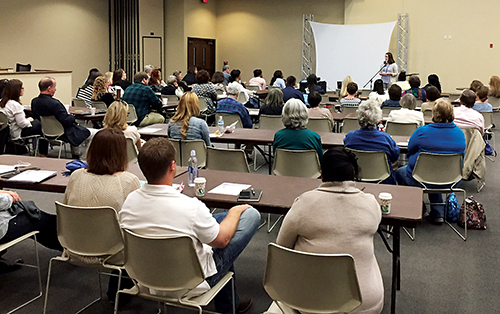JACKSON – April is recognized nationally as Child Abuse Prevention Month. The Catholic Church across America use this month as a way to reinforce the message that the Catholic Church is committed to protecting children. The following is from the U.S. Conference of Catholic Bishops and reflects both diocesan and national promise to protect and pledge to heal.
You Can Help
You can help prevent the abuse of children. Know the warning signs of offenders. They prefer to be with children. They go overboard touching, wrestling or tickling. They may give minors alcohol or drugs or show them pornography. They allow children to break the rules. Offenders act as if the rules do not apply to them.
If you observe an adult who is not behaving appropriately with children, speak up. Let someone know what you saw. You are not accusing anyone of anything. You are letting someone know you care, are watching, and are concerned that no harm is done to a child.
You Can Get Help
Abuse is never the fault of the person harmed. It is always the responsibility of the offender. The reality is that most victims of abuse know their abuser. One in four females and one in six males report being abused as a minor.
If you or someone you know is a victim of abuse there are things you can do, even if the abuse happened years ago. Call the police to report the abuse. If the abuser was in a position of authority in an organization, you should also report the abuse to that organization. If the abuse happened in a Catholic church or school, contact Valerie McClellan, Victims Assistance Coordinator for the Diocese of Jackson, at 601-326-3728.
The Charter
In Dallas in June of 2002, the bishops of the United States adopted the Charter for the Protection of Children and Young People. The Charter is the plan of action developed by the bishops to address the clergy sexual abuse scandal.
Part One- To Promote Healing and Reconciliation with Victims/Survivors of Abuse
The wording of the Charter is very clear on the importance the bishops place on their responsibility to help victims find healing and reconciliation. It states, “The first obligation of the Church with regard to victims is for healing and reconciliation.” Outreach takes a variety a forms including extensive therapy, apology meetings, spiritual retreats, and Masses for healing.
In 2016, outreach was provided to 1,760 victims and their families.
Part Two- To Guarantee an Effective Response to Allegations of Sexual Abuse of Minors
All dioceses are to report allegations of sexual abuse of minors to public authorities. All clergy who have been found guilty or admitted guilt are permanently removed from ministry. There are clear standards of behavior and appropriate boundaries for all clergy employees, and volunteers.
Part Three- To Ensure the Accountability of Our Procedures
The mission of the Bishops’ Committee for the Protection of Children and Young People is to advise the United States Conference of Catholic Bishops on all matters related to child and youth protection. The Secretariat of Child and Youth Protection was established in 2002 by the USCCB. The National Review Board is a consultative body that reviews the work of the Secretariat of Child and Youth Protection and advises the president of the USCCB. In addition, each diocese has a review board to advise its bishop in his assessment of allegations and in his determination of a cleric’s suitability for ministry. To prove their commitment to accountability, dioceses undergo an annual audit conducted by an outside auditor.
Part Four- To Protect the Faithful in the Future
Dioceses train clergy, employees and volunteers to create and maintain safe environments for children. The backgrounds of clergy, employees, and volunteers are evaluated to determine if someone should be allowed around children and young people.
More than two million parish employees and volunteers, and 4.2 million children have been Safe Environment trained to recognize the behavior offenders and what to do about it. Training was also provided to 159,764 educators, 258,978 other employees, 35,475 priests, 16,294 deacons and 6,847 candidates for ordination.
Background evaluations have been conducted on more than 2 million parish volunteers and Church personnel who have contact with children. Seminary screening has been tightened and transfers among dioceses of clergy who have committed abuse against minors are forbidden.

